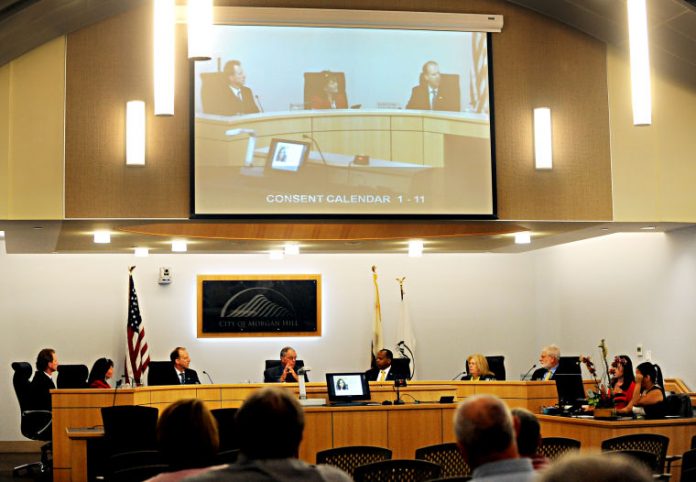While Morgan Hill officials and members of the public continue to question if the new council district election system will achieve its goal of obtaining more Latino representatives on the dais, one of the residents who threatened to sue the city insists the change will at minimum make it easier for marginalized voters to participate.
Armando Benavides is one of three Latino Morgan Hill residents who hired the Oakland law firm Goldstein, Borgen, Dardarian & Ho, which sent the city a demand letter May 2 informing them that the current at-large voting system is in violation of the California Voting Rights Act.
Benavides said one startling revelation brought to light during recent discussions of Morgan Hill demographics is that only 25 percent of the city’s Latino population voted in the 2016 election.
“To me that’s a real serious concern,” said Benavides, a former candidate for Morgan Hill City Council and the Morgan Hill Unified School District board of trustees. “We need to find a way to fire up the base.”
Morgan Hill has not elected a Latino mayor or council member since at least 2000.
He explained that under a district election system—in which the city is divided into four geographic sections equal in population, each one represented by a single council member—candidates for office will have a much smaller area to campaign and get to know the voters and residents.
“District elections will make it easier to go out and knock on doors at election time because the districts are smaller,” Benavides said. “It’s easier, less costly and more effective.”
The current council voted in June to transition to a district election system, which is starkly different from the at-large elections the city has conducted since its inception. The council is in the process of hosting a series of public meetings and workshops on the district system. The city and demographer National Demographics Corporation—hired by the council to help with the process—created a website, drawmh.org, that allows residents to propose their own maps of the city divided up into four electoral districts.
The council is expected to approve a four-district map in late August or early September. The district election system will start with the November 2018 election, when the seats occupied by Councilman Rich Constantine and Councilwoman Caitlin Jachimowicz will be on the ballot.
Both these council members voted in favor of the change to a by-district system June 7, but only to protect the city from a costly lawsuit. They have been skeptical that the new system will be more equitable and inclusive of minority voters.
Another advantage of district elections, according to Benavides, is that the residents of a particular neighborhood or district might share the same concerns and needs of the candidate or council member running for office within that district.
Benavides also argued that since MHUSD transitioned to a by-district election system in 2015—also at the demand of Goldstein, Borgen, Dardarian & Ho—the board of education has already seen the election of good representatives. Specifically, he was referring to Trustees Tom Arnett (who was appointed to the board before he won the 2016 election), Teresa Murrillo and Mary Patterson. Murrillo is currently the only Latino member of the school board. She ran unopposed in her district in 2016.
“I don’t think any of those would have been elected without district elections,” Benavides said.
Benavides as well as Morgan Hill residents Sally Casas and Brenda Cayme hired the Oakland firm to send the city the May 2 demand letter, according to a June 19 letter from the firm to the city. Cayme ran for MHUSD school board in 2014, but lost.
The initial demand letter explained that the city’s at-large election system dilutes minority representation on the council.
Can MH keep citywide mayor?
Attorneys continue to argue whether the citywide election of the city’s mayor would be in violation of the CVRA. Morgan Hill officials are planning to keep the city’s mayor position—currently occupied by Steve Tate—elected at-large.
Attorney Mike Baller of the Goldstein, Borgen, Dardarian & Ho firm says such a system—with four council districts and one citywide mayor—would continue to be illegal. The alternative would be to create five council districts, and then those five council members would rotate year-to-year as mayor, or appoint one among them to serve as mayor for a specified term.
However, Morgan Hill City Attorney Don Larkin noted that other laws are on the city’s side. Because the voters of Morgan Hill approved the change to a citywide mayor in a previous election, only the voters can change it to another method. Larkin estimated the voters adopted the citywide elected mayor system in an election in the mid-1990s.
“The city can’t legally do what we demanded they do, which is to adopt five council districts by resolution,” Baller said. “The best they can do is (four council districts, one citywide mayor) and then have an election where the at-large system for mayor itself is changed by a vote of the people. That’s the bind the city is in, and I understand the position.”
<
Residents and a professional demographer have submitted more than a dozen city council district map proposals, which are available for public review on a website created to set up the new election system. The draft maps can be viewed at drawmh.org, which provides a wealth of map drawing tools and demographic information about the City of Morgan Hill. Residents can continue to draw their own map proposals using the website.








